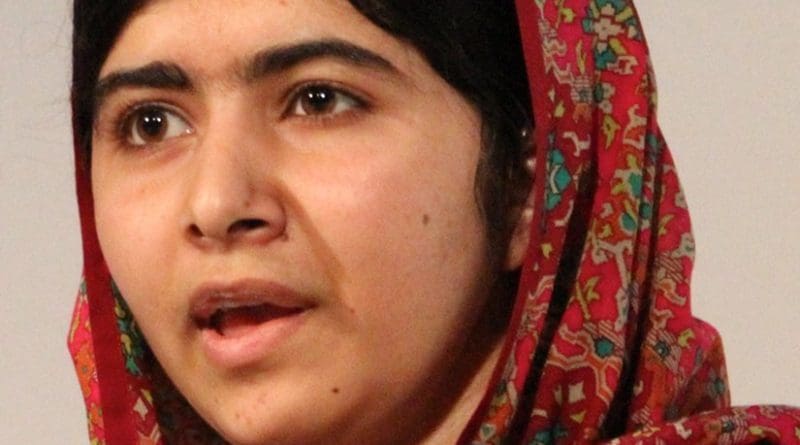Why 14-Year-Old Malala Is Important For Pakistan – OpEd
By Mazhar Iqbal
Malala Yousafzai, 14, is the new face of Pakistan – the country that has persistently been pushed as the hotbed of militant Islam. She is not only the latest victim of an extremely criticised brand of Muslim faith that supports the totalitarian interpretation of Islamic law, but also a new hope for a whole generation of moderate and tolerant Pakistanis.
A segment of local Pakistani and international media has reported that this teenage blogger was attacked for being vocal on women education in a primitive society that does not support women’s equal role in society as compared to men. Yet, the Taliban, who attacked Malala has clearly stated that she was targeted because of her pioneer role in preaching secularism and moderation in Muslim society. They have also mentioned that whosoever will commit so in the future he will be targeted. The latest media reports say they have threatened to kill the injured girl’s parents.
The Taliban were described as eliminated from this area after the massive clean-up operation by Pakistani security agencies. But, this incident has proved that they were still operating in heavily guarded zone and Pakistan’s security apparatus was not fully aware of the situation on the ground.
Over the years, it has been the favorite issue for global media that the Taliban has a popular support among local masses, particularly in Northern Pakistan. Now, some of the media pundits claim that this attack seems to be launched to check the popularity of the Taliban movement in these areas. In fact, if they were hoping for more populist division in Pakistan with the attack on an innocent girl, they appear to have underestimated.
During the last two days, the world has witnessed a large-scale protest and anger by all Pakistanis, including political parties, civil society and media that shows a different story. Even those who have been vocal and deeply involved in creating confusion about extremely debated blasphemy laws have denounced this appalling incident.
Such a popular and collective sympathy for Malala has slapped on the faces of those who were skeptical about this country’s existence as a tolerant society. Now, Pakistan people are confident to ask questions about totalitarian approach in defining political and ambitious aspects of Muslim faith. They are wondering whether it is enough to change deep-seated and orthodox sentiments about the role religion must play in running the affairs of a modern state.
Some of the political faces on the helm of affairs in Pakistan are still endorsing the views that banning women from education, publicly executing those who do not practice Islam in their daily life and killing innocents have something inherent to Islam.
It’s encouraging that mainstream media in Pakistan has applauded Malala’s side of the story. It has also been reported that some of the media houses have been put on hit-lists of the Taliban for exceedingly advocating the Malala cause. It is now clear that why the Taliban attempted to silence the voice of 14-year-girl. It was fear, not faith, which drove them to attack this gallant girl. After all, she was writing a blog for BBC about her life under the Taliban and was the recipient of the national peace prize in 2011.
Some of the critics of media have raised objection on not highlighting the critical and sad plight of other girls who were injured with Malala. Yes, they need to be given the best possible care and treatment from the state and they also rightly deserve the prayers and well wishes of millions of Pakistanis as they keep for Malala.
They could be as important as Malala. It is not Malala who climbed heights of national pride and international applaud after a cowardly attack on her life; it is her message that is gaining popularity and showing the accurate face of Pakistan. They all are on the streets, on the TV screens, newspaper pages and everywhere; all saying Malala, you are not alone. Millions of voices of fellow Pakistanis are with you. They have a shared stance that in the war against terrorism they are not with the Taliban.
(The writer is associated with Press for Peace and can be reached at [email protected] )


Only The teachings of Islam will ever save Pakistan-not the salafist/wahabi idealogy of Saudi Arabia.Follow Iran and only then the Pakistanis will be able to have sovereignity of their state.
The ink of the scholar is more sacred than the blood of the martyr